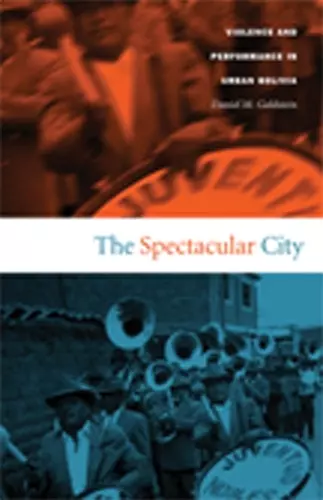The Spectacular City
Violence and Performance in Urban Bolivia
Format:Hardback
Publisher:Duke University Press
Published:18th Aug '04
Currently unavailable, and unfortunately no date known when it will be back

This study analyzes a popular festival and vigilante lynching, examining them as a form of political spectacle performed by improverished people who want to gain access to the potential benefits of citizenship in a modern city.
Since the Bolivian revolution in 1952, migrants have come to the city of Cochabamba, seeking opportunity and relief from rural poverty. They have settled in barrios on the city’s outskirts only to find that the rights of citizens—basic rights of property and security, especially protection from crime—are not available to them. In this ethnography, Daniel M. Goldstein considers the significance of and similarities between two kinds of spectacles—street festivals and the vigilante lynching of criminals—as they are performed in the Cochabamba barrio of Villa Pagador. By examining folkloric festivals and vigilante violence within the same analytical framework, Goldstein shows how marginalized urban migrants, shut out of the city and neglected by the state, use performance to assert their national belonging and to express their grievances against the inadequacies of the state’s official legal order.
During the period of Goldstein’s fieldwork in Villa Pagador in the mid-1990s, residents attempted to lynch several thieves and attacked the police who tried to intervene. Since that time, there have been hundreds of lynchings in the poor barrios surrounding Cochabamba. Goldstein presents the lynchings of thieves as a form of horrific performance, with elements of critique and political action that echo those of local festivals. He explores the consequences and implications of extralegal violence for human rights and the rule of law in the contemporary Andes. In rich detail, he provides an in-depth look at the development of Villa Pagador and of the larger metropolitan area of Cochabamba, illuminating a contemporary Andean city from both microethnographic and macrohistorical perspectives. Focusing on indigenous peoples’ experiences of urban life and their attempts to manage their sociopolitical status within the broader context of neoliberal capitalism and political decentralization, The Spectacular City highlights the deep connections between performance, law, violence, and the state.
“The Spectacular City is a highly original contribution to the ethnography of law, violence, and the state. Goldstein explores the connections between localism and violence both as situated action and as genres of performance, resulting in a nuanced analysis of politics between state and nonstate forms.”—Carol Greenhouse, coeditor of Ethnography in Unstable Places: Everyday Lives in Contexts of Dramatic Political Change
“Fascinating and rich in ethnographic detail, The Spectacular City is particularly important at this moment because it examines the increase in common crime that has accompanied the consolidation of neoliberal capitalism in Latin America. Although it is widely appreciated that crime has gotten worse, there are very few anthropological studies that explore this phenomenon at the local level.”—Lesley Gill, author of The School of the Americas: Military Training and Political Violence in the Americas
ISBN: 9780822333609
Dimensions: unknown
Weight: 508g
296 pages